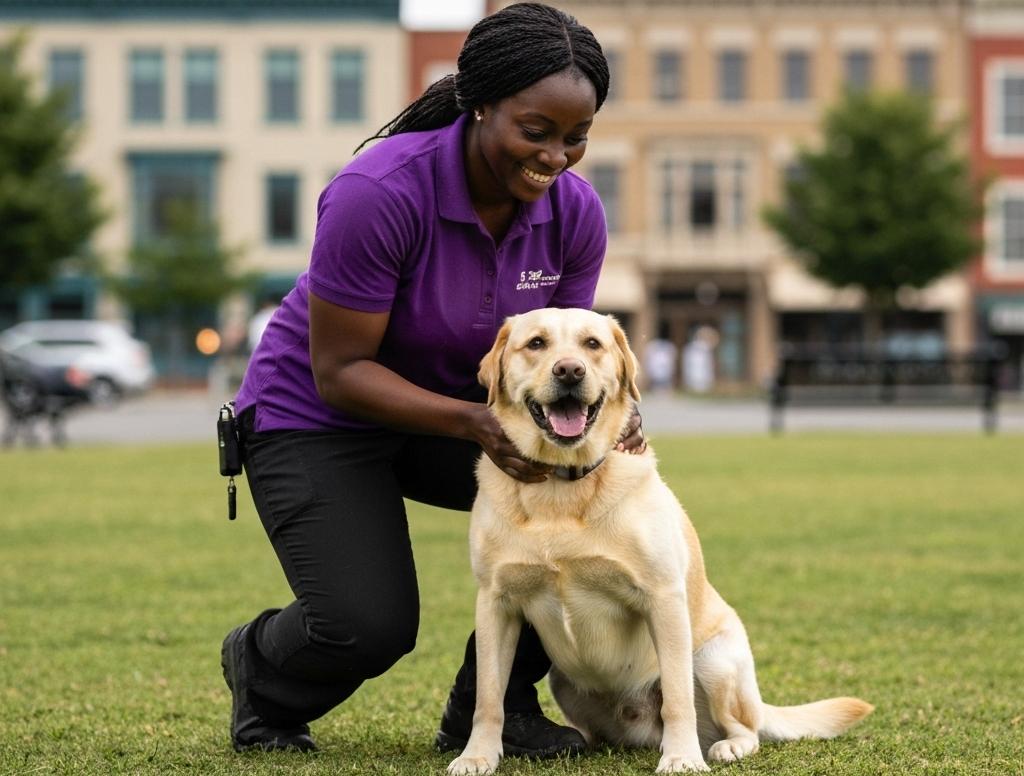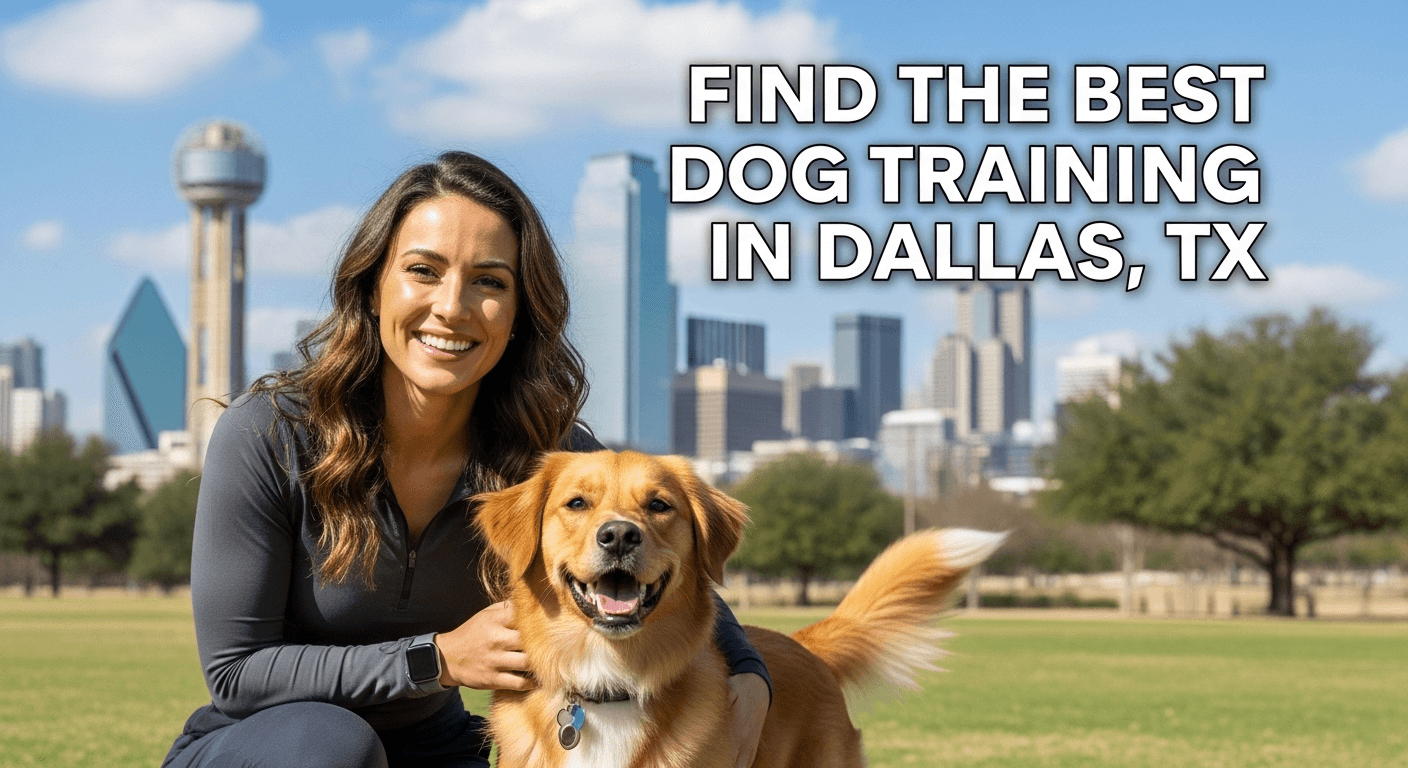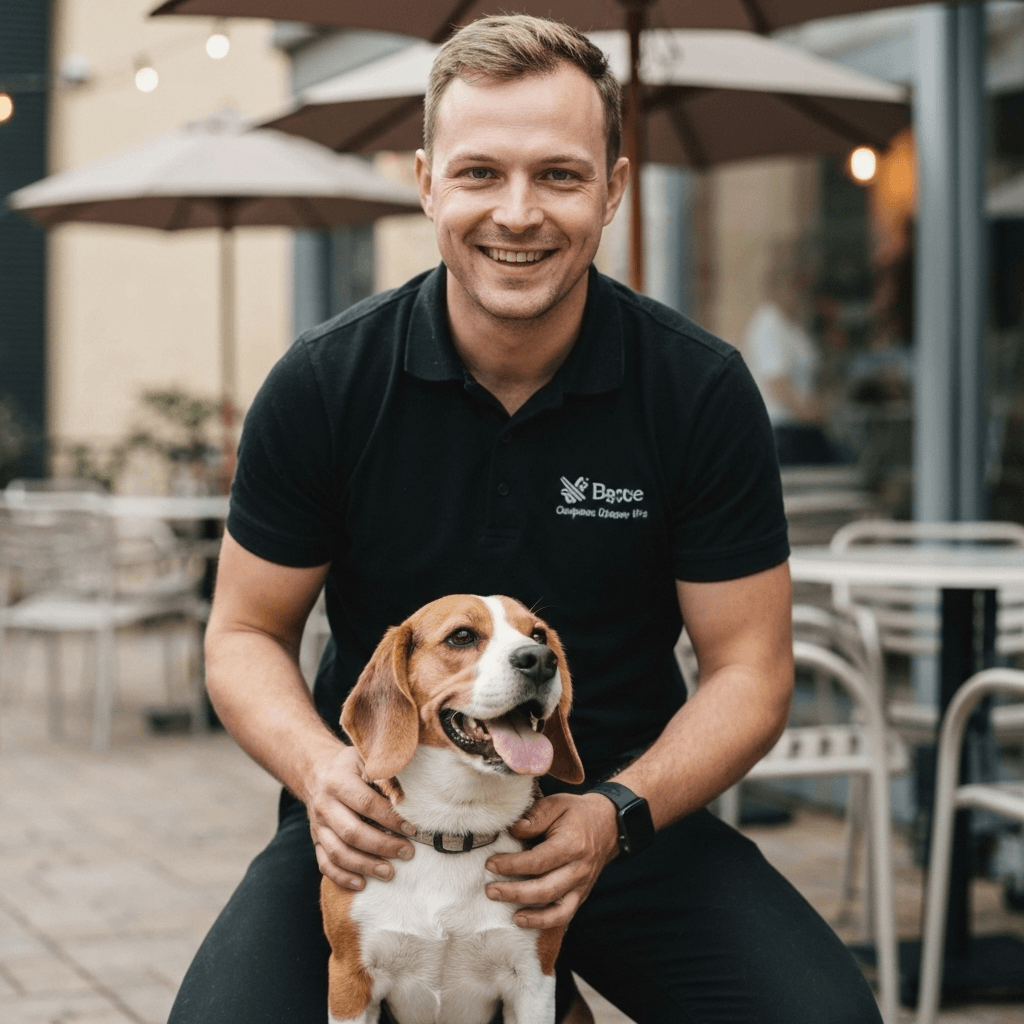Your Complete Guide to Choosing a Dog Trainer in Dallas
Living with a dog in Dallas means navigating busy sidewalks in Uptown, enjoying weekend mornings at White Rock Lake, and maybe grabbing dinner on a Deep Ellum patio with your furry friend by your side. Your dog needs to handle all of this with confidence, which is why choosing the right trainer matters so much.
The best training doesn’t just happen in a quiet classroom. It prepares your dog for real Dallas life, with all its scooters, food trucks, and weekend crowds.
Dallas sits in the heart of Texas, and our local rules shape how and where you can train your dog. Understanding the city’s leash requirements, microchip laws, and park policies will help you make smart decisions about training programs and budgets.
How to Choose the Right Trainer
When you’re looking for a trainer, focus on someone who uses positive reinforcement methods and understands what it’s like to train a dog in a busy city. You want someone who can help you practice around real distractions, like the cyclists on Katy Trail or the weekend energy around Klyde Warren Park.
Ask about their education and look for solid certifications like KPA-CTP, CPDT-KA, or IAABC-CDBC. These credentials show the trainer has invested in learning humane, effective methods.
The best Dallas trainers understand that training needs to happen in steps. You might start practicing at home, then move to quiet neighborhood streets, and eventually work your way up to busier spots like the Dallas Farmers Market. This gradual approach helps your dog succeed instead of getting overwhelmed.
If you’re considering in-home training, make sure to ask about service areas and any extra fees for neighborhoods further out. For group classes, check that they require proof of vaccinations and keep class sizes small enough for individual attention.
Day training and board-and-train programs can speed up results, but always ask how much owner coaching is included. After all, the skills need to stick when your dog comes home to you.
Common Dog Training Methods You’ll Encounter

Most good trainers in Dallas focus on methods that keep dogs happy and eager to learn. Here’s what you’ll likely see:
Positive reinforcement training rewards the behaviors you want to see more of. This approach works especially well in our busy city because it builds your dog’s confidence around distractions instead of making them more anxious.
Behavior modification helps dogs who struggle with reactivity, fear, or aggression. These programs use careful desensitization and counter-conditioning, and the best trainers will work with your vet when needed.
Puppy training focuses on socialization, house training, and bite inhibition. In Dallas, this also means getting your puppy comfortable with city sounds like buses, construction, and the general buzz of urban life.
Basic obedience covers the essentials: sit, down, stay, recall, and loose-leash walking. These skills are your foundation for enjoying Dallas with your dog, whether you’re walking through Bishop Arts or visiting a dog-friendly brewery.
Leash training deserves special attention here since Dallas requires dogs to be restrained off your property. Good leash skills make the difference between stressful walks and enjoyable ones.
Service dog training and therapy dog training are specialized areas that require longer programs and specific public-access training. Not every trainer offers these services, so ask specifically if this is your goal.
Stay away from trainers who rely on intimidation or punishment-based methods. The goal is a well-behaved dog who genuinely enjoys being with you, not one who obeys out of fear.
What You Can Expect to Pay in Dallas
Training costs vary based on the trainer’s experience, session length, and where you live. You’ll typically pay more for complex behavior issues and premium in-home services in popular neighborhoods.
| Service Type | Average Cost in Dallas |
|---|---|
| Group classes (4–6 weeks) | $175 – $350 total |
| Puppy classes (4–6 weeks) | $180 – $360 total |
| Private lessons (60–90 minutes) | $110 – $200 per session |
| In-home dog training packages (4–6 sessions) | $450 – $900 total |
| Day training (trainer works your dog + owner handoff) | $500 – $1,000 per week |
| Board and train (2–4 weeks) | $2,200 – $5,000 total |
| Behavior consult for reactivity or fear | $150 – $300 initial session |
Many trainers offer a consultation call to discuss your goals and recommend the right program. Take advantage of this to get a clear picture of what’s included, how they measure progress, and any additional fees you should know about.
Dallas Rules That Shape Your Training Plan
Understanding local regulations helps you train more effectively and avoid problems down the road.
Dallas requires dogs to be on leash or otherwise restrained when they’re off your property. This includes parks and trails unless you’re in a designated off-leash area, so solid leash skills are essential for daily life here.
The city also requires microchipping as permanent identification. This smart policy helps lost dogs get reunited with their families quickly, and it’s something to keep in mind when you’re working on recall training.
Texas requires current rabies vaccination for all dogs, and most training facilities also ask for DHPP and Bordetella vaccines before group classes. Keep these records handy when you’re shopping for training programs.
Excessive barking can lead to nuisance complaints, so factor in enrichment and training to address boredom or anxiety-related barking. Your neighbors will appreciate a well-exercised, mentally stimulated dog.
If you want to do organized training in city parks, commercial activities may require permits from Dallas Park and Recreation. Casual practice sessions are fine as long as you follow posted rules and clean up after your dog.
For specific questions about rabies requirements, check the Texas Department of State Health Services rabies resources.
Questions Worth Asking Any Trainer

Getting clear answers to these questions will help you find the right fit:
- What training methods do you use, and how do you keep sessions positive and low-stress?
- What certifications do you hold, and how do you stay current with training techniques?
- How will you customize a program for my dog’s specific needs and our Dallas lifestyle?
- Do you offer in-home training, group classes, or day training, and which option fits my goals?
- How do you measure progress and decide when to add more challenging distractions?
- What exactly is included in your packages, and are there any additional fees I should know about?
- Do you carry liability insurance, and can you provide proof?
- For behavior issues, do you work with veterinarians when needed?
- What kind of practice should I expect to do between sessions?
- Do you offer a consultation to discuss our specific situation?
Dallas Spots That Support Your Training Goals
These local resources give you great places to practice and stay informed about city policies:
White Rock Lake Dog Park offers fenced off-leash areas and water access for advanced training. Check current hours and rules at Dallas Park & Recreation: White Rock Lake Dog Park.
NorthBark Dog Park in Far North Dallas provides large spaces for recall practice and socialization. Details are available at Dallas Park & Recreation: NorthBark Dog Park.
Bark Park Central near Deep Ellum lets you practice with urban sounds nearby, which is perfect for city conditioning. Find information at Dallas Park & Recreation: Bark Park Central.
For a complete list of dog parks and their specific rules, visit Dallas Park & Recreation: Dog Parks.
The Dallas Farmers Market is excellent for practicing calm behavior around crowds and food smells. Check their pet policies at Dallas Farmers Market FAQ.
Katy Trail offers great opportunities for leashed walking practice in a more controlled environment. Learn about trail etiquette at Katy Trail Dallas.

Common Questions About Dog Training in Dallas
How much does in-home dog training cost?
Most in-home training packages in Dallas range from $450 to $900 for 4-6 sessions. Individual sessions typically cost $110-200, depending on the trainer’s experience and how far they need to travel.
Is in-home dog training worth the extra cost?
For many Dallas dog owners, yes. In-home training works especially well if you have a busy schedule or if your dog gets distracted or stressed in group settings. You’ll also work on issues specific to your home, like doorbell reactions or delivery truck alerts.
Can I hire someone to house train my dog?
Absolutely. Many trainers offer puppy programs that include house training support, and some provide day training services where they work with your dog during the day and then teach you how to maintain the routine.
What is the 3-3-3 rule for dogs?
This helpful guideline suggests that newly adopted dogs need about 3 days to decompress from the stress of change, 3 weeks to start learning your routines, and 3 months to fully settle in and show their true personality. It’s a good reminder to be patient with new dogs.
How long does dog training typically take?
Basic obedience usually takes 4-8 weeks with consistent practice between sessions. Behavior issues like reactivity or separation anxiety often require longer, more structured programs. Your trainer should give you realistic timelines based on your specific goals.
What should I bring to group training classes?
Pack a well-fitted collar or harness, a standard 6-foot leash (not retractable), high-value treats cut into small pieces, water for your dog, and vaccination records if the facility requires them.

What are Dallas’s leash laws?
Dallas requires dogs to be leashed or otherwise restrained whenever they’re off your property. This includes parks, trails, and sidewalks throughout the city. Off-leash time is only allowed in designated dog park areas.
Do I need to license my dog in Dallas?
Dallas uses microchipping rather than traditional licensing for permanent identification. Make sure your dog is microchipped and that your contact information is current in the chip registry database.
What vaccines does my dog need in Dallas?
Texas requires current rabies vaccination. Most training facilities and dog parks also require DHPP (distemper, hepatitis, parvovirus, parainfluenza) and Bordetella (kennel cough) vaccines, so keep those records handy.
Do dog trainers need special licenses in Texas?
Texas doesn’t require special licensing for dog trainers. Look for trainers with voluntary certifications like KPA-CTP or CPDT-KA, and make sure they carry liability insurance.
Where can I practice off-leash recall safely?
Fenced dog parks like White Rock Lake, NorthBark, or Bark Park Central are your best options for safe off-leash practice. Master recall in these controlled environments before attempting it in more challenging settings.
Can I train my dog at Dallas parks?
Yes, casual training is welcome at city parks as long as you follow posted rules, keep your dog leashed where required, and clean up after them. For organized commercial training, you may need permits from the parks department.
Are there dog-friendly trails in Dallas for training?
Dallas doesn’t have beaches, but trails like Katy Trail and the paths around White Rock Lake are great for leashed training walks. Start during quieter times of day to work on focus before tackling busier periods.
Making Training Work in Dallas
The key to successful training in our city is gradually building your dog’s confidence around urban distractions. Start with short sessions near busy areas like Bishop Arts District or Lower Greenville, and reward calm, focused behavior generously.
Always carry treats and keep a standard 6-foot leash handy for impromptu training moments. Teaching your dog to greet people politely will make them welcome at more local patios and events.
For serious behavior challenges, look for trainers with advanced credentials like IAABC-CDBC or CBCC-KA. These certifications show specialized knowledge in behavior modification and consulting.
Remember that good training is an investment in years of enjoyable life together in this vibrant city. With the right approach and trainer, your dog can become a confident, well-behaved companion who’s ready for everything Dallas has to offer.
